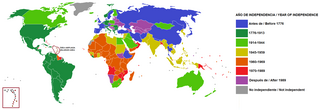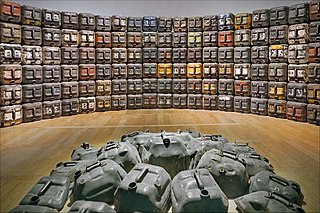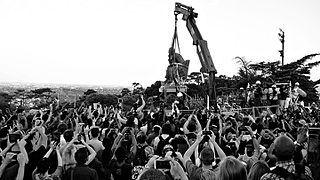Related Research Articles
Utopian and dystopian fiction are subgenres of speculative fiction that explore social and political structures. Utopian fiction portrays a setting that agrees with the author's ethos, having various attributes of another reality intended to appeal to readers. Dystopian fiction offers the opposite: the portrayal of a setting that completely disagrees with the author's ethos. Some novels combine both genres, often as a metaphor for the different directions humanity can take depending on its choices, ending up with one of two possible futures. Both utopias and dystopias are commonly found in science fiction and other types of speculative fiction.

Decolonization is the undoing of colonialism, the latter being the process whereby imperial nations establish and dominate foreign territories, often overseas. The meanings and applications of the term are disputed. Some scholars of decolonization focus especially on independence movements in the colonies and the collapse of global colonial empires.
Postcolonial feminism is a form of feminism that developed as a response to feminism focusing solely on the experiences of women in Western cultures and former colonies. Postcolonial feminism seeks to account for the way that racism and the long-lasting political, economic, and cultural effects of colonialism affect non-white, non-Western women in the postcolonial world. Postcolonial feminism originated in the 1980s as a critique of feminist theorists in developed countries pointing out the universalizing tendencies of mainstream feminist ideas and argues that women living in non-Western countries are misrepresented.
Latino studies is an academic discipline which studies the experience of people of Latin American ancestry in the United States. Closely related to other ethnic studies disciplines such as African-American studies, Asian American studies, and Native American studies, Latino studies critically examines the history, culture, politics, issues, sociology, spirituality (Indigenous) and experiences of Latino people. Drawing from numerous disciplines such as sociology, history, literature, political science, religious studies and gender studies, Latino studies scholars consider a variety of perspectives and employ diverse analytical tools in their work.
Latin American poetry is the poetry written by Latin American authors. Latin American poetry is often written in Spanish, but is also composed in Portuguese, Mapuche, Nahuatl, Quechua, Mazatec, Zapotec, Ladino, English, and Spanglish. The unification of Indigenous and imperial cultures produced a unique and extraordinary body of literature in this region. Later with the introduction of African slaves to the new world, African traditions greatly influenced Latin American poetry. Many great works of poetry were written in the colonial and pre-colonial time periods, but it was in the 1960s that the world began to notice the poetry of Latin America. Through the modernismo movement, and the international success of Latin American authors, poetry from this region became increasingly influential.
Frederick Luis Aldama is an American author, editor, and academic. He is the Jacob & Frances Sanger Mossiker Chair in the Humanities and founder and director of the Latinx Pop Lab at the University of Texas, Austin. At UT Austin is also affiliate faculty in Latino Media Arts & Studies and LGBTQ Studies. He continues to hold the title Distinguished University Professor as adjunct professor at The Ohio State University. He teaches courses on Latinx pop culture, especially focused on the areas of comics, TV, film, animation, and video games in the departments of English and Radio-Television-Film at UT Austin. At the Ohio State University he was Distinguished University Professor, Arts & Humanities Distinguished Professor of English, University Distinguished Scholar, and Alumni Distinguished Teacher as well as recipient of the Rodica C. Botoman Award for Distinguished Teaching and Mentoring and the Susan M. Hartmann Mentoring and Leadership Award. He was also founder and director of the award-winning LASER/Latinx Space for Enrichment Research and founder and co-director of the Humanities & Cognitive Sciences High School Summer Institute. In has been inducted into the National Academy of Teachers, National Cartoonist Society, the Texas Institute of Letters, the Ohio State University's Office of Diversity & Inclusion Hall of Fame, and as board of directors for The Academy of American Poets. He sits on the boards for American Library Association Graphic Novel and Comics Round Table, BreakBread Literacy Project, and Ad Astra Media. He is founder and director of UT Austin's BIPOC POP: Comics, Gaming & Animation Arts Expo & Symposium as well as Founder and Editor-in-Chief of the Latinx Pop Magazine.
Giannina Braschi is a Puerto Rican poet, novelist, dramatist, and scholar. Her notable works include Empire of Dreams (1988), Yo-Yo Boing! (1998) and United States of Banana (2011).
Speculative fiction is defined as science fiction, fantasy, and horror. Within those categories exists many other subcategories, for example cyberpunk, magical realism, and psychological horror.
Postcolonialism is the critical academic study of the cultural, political and economic legacy of colonialism and imperialism, focusing on the impact of human control and exploitation of colonized people and their lands. The field started to emerge in the 1960s, as scholars from previously colonized countries began publishing on the lingering effects of colonialism, developing a critical theory analysis of the history, culture, literature, and discourse of imperial power.
The coloniality of power is a concept interrelating the practices and legacies of European colonialism in social orders and forms of knowledge, advanced in postcolonial studies, decoloniality, and Latin American subaltern studies, most prominently by Anibal Quijano. It identifies and describes the living legacy of colonialism in contemporary societies in the form of social discrimination that outlived formal colonialism and became integrated in succeeding social orders. The concept identifies the racial, political and social hierarchical orders imposed by European colonialism in Latin America that prescribed value to certain peoples/societies while disenfranchising others.
María Cristina Lugones was an Argentine feminist philosopher, activist, and Professor of Comparative Literature and of women's studies at Carleton College in Northfield, Minnesota and at Binghamton University in New York State. She identified as a U.S-based woman of color and theorized this category as a political identity forged through feminist coalitional work.

Decoloniality is a school of thought that aims to delink from Eurocentric knowledge hierarchies and ways of being in the world in order to enable other forms of existence on Earth. It critiques the perceived universality of Western knowledge and the superiority of Western culture, including the systems and institutions that reinforce these perceptions. Decolonial perspectives understand colonialism as the basis for the everyday function of capitalist modernity and imperialism.
Latino literature is literature written by people of Latin American ancestry, often but not always in English, most notably by Mexican Americans, Puerto Ricans, Cuban Americans, and Dominican Americans, many of whom were born in the United States. The origin of the term "Latino literature" dates back to the 1960s, during the Chicano Movement, which was a social and political movement by Mexican Americans seeking equal rights and representation. At the time, the term "Chicano literature" was used to describe the work of Mexican-American writers. As the movement expanded, the term "Latino" came into use to encompass writers of various Latin American backgrounds, including Mexican, Puerto Rican, Cuban, and others.
Latinx is a neologism in American English which is used to refer to people of Latin American cultural or ethnic identity in the United States. The gender-neutral ⟨-x⟩ suffix replaces the ⟨-o/-a⟩ ending of Latino and Latina that are typical of grammatical gender in Spanish. Its plural is Latinxs. Words used for similar purposes include Latin@, Latine, and the simple Latin. Related gender-neutral neologisms include Xicanx or Chicanx.

Emma Pérez is an American author and professor, known for her work in queer Chicana feminist studies.
Ramón Grosfoguel is a Puerto Rican sociologist who belongs to the Modernity / Coloniality Group who is a full Professor of Chicano/Latino Studies in the Department of Ethnic Studies at University of California, Berkeley.

Xicanx is an English-language gender-neutral neologism and identity referring to people of Mexican descent in the United States. The ⟨-x⟩ suffix replaces the ⟨-o/-a⟩ ending of Chicano and Chicana that are typical of grammatical gender in Spanish. The term references a connection to Indigeneity, decolonial consciousness, inclusion of genders outside the Western gender binary imposed through colonialism, and transnationality. In contrast, most Latinos tend to define themselves in nationalist terms, such as by a Latin American country of origin.

Decolonization of knowledge is a concept advanced in decolonial scholarship that critiques the perceived hegemony of Western knowledge systems. It seeks to construct and legitimize other knowledge systems by exploring alternative epistemologies, ontologies and methodologies. It is also an intellectual project that aims to "disinfect" academic activities that are believed to have little connection with the objective pursuit of knowledge and truth. The presumption is that if curricula, theories, and knowledge are colonized, it means they have been partly influenced by political, economic, social and cultural considerations. The decolonial knowledge perspective covers a wide variety of subjects including philosophy, science, history of science, and other fundamental categories in social science.

Coloniality of knowledge is a concept that Peruvian sociologist Anibal Quijano developed and adapted to contemporary decolonial thinking. The concept critiques what proponents call the Eurocentric system of knowledge, arguing the legacy of colonialism survives within the domains of knowledge. For decolonial scholars, the coloniality of knowledge is central to the functioning of the coloniality of power and is responsible for turning colonial subjects into victims of the coloniality of being, a term that refers to the lived experiences of colonized peoples.
Nelson Maldonado-Torres is a Puerto Rican philosopher and professor in Philosophy at University of Connecticut-Storrs. He received his PhD from Brown University in Religious Studies. His work has been influential in contributing to ideas about decoloniality decolonizing epistemology, and in critiquing Western liberalism and Eurocentrism. He is influenced by the works of Frantz Fanon, Emmanuel Levinas, and Enrique Dussel.
References
- 1 2 3 Betts, Raymond F. Beyond Empire and Nation.
- 1 2 3 4 von Bismarck, Helene. "Defining Decolonization". The British Scholar Society.
- 1 2 Adom Getachew (2019). Worldmaking after Empire: The Rise and Fall of Self-Determination. Princeton University Press. ISBN 978-0-691-18434-0.
- ↑ "Interview - Walter Mignolo/Part 2: Key Concepts". E-International Relations. Retrieved 2020-03-19.
- 1 2 Tuck, Eve; Yang, K. Wayne. "Decolonization is not a metaphor" (PDF). Decolonization: Indigeneity, Education & Society. 1: 1–40.
- 1 2 3 Martínez San Miguel, Yolanda (February 2018). "Rethinking the Colonial Latinx Literary Imaginary". The Cambridge History of Latina/o American Literature. pp. 93–118. doi:10.1017/9781316869468.006. ISBN 978-1-316-86946-8 . Retrieved 2020-03-19.
{{cite book}}:|website=ignored (help) - ↑ León, Concepción de (2018-11-29). "8 Books Reshaping Latinx Literature". The New York Times. ISSN 0362-4331 . Retrieved 2020-04-15.
- 1 2 "Decolonize Sci-Fi: This Film Series Showcases Utopian & Dystopian Tales Set in Latin America". Remezcla. 2019-04-22. Retrieved 2020-04-15.
This article needs additional or more specific categories .(March 2024) |